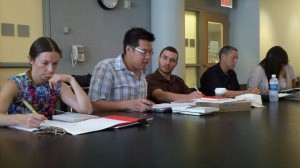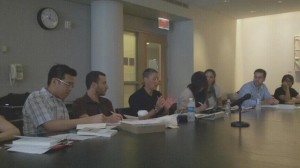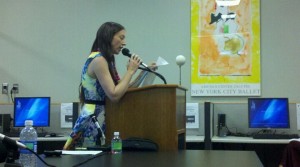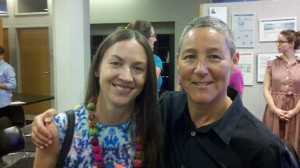[this is the text of an email message just distributed to our mailing lists; apologies for duplication!]
Dear Everyone:
We hope this message finds you enjoying the last bits of summer and transitioning into the new academic year restored and ready. Our beginning of term happily includes getting RevAmStudies going for the year. Since we last wrote, we were successfully able to articulate this initiative to the Advanced Research Collaborative, a new entity at the Graduate Center under which collective research projects are running. We want to thank Professor Donald Robotham, the ARC’s director, as well as Provost Chase Robinson, for their support of this endeavor. And, we remain indebted to the support of President William Kelly and his office (especially Sandy Robinson), and to the Center for the Humanities, whose director, Aoibheann Sweeney, and staff (especially Sam Starkweather) continue to be enormously helpful. We are delighted that Christopher Eng and Cambridge Ridley-Lynch continue on as our graduate student collaborators.
We remain committed to the project of privileging Americanist inquiry as a critical site of engaged knowledge production and pedagogy, and we’ll continue to do our best to offer programming and support that will enhance your work and crystallize the intellectual communities invested in American studies. We plan this year to make the blog more robust, and to find more ways of circulating the work of the initiative – your work! — through CUNY and well beyond. As always, we welcome any suggestions or input of any kind in pushing this initiative forward. We’ll be working on the spring programming soon and will make a “save the date” announcement as soon as the pieces are in place.
As you might’ve seen on facebook or the blog (https://revolutionizingamericanstudies.commons.gc.cuny.edu/), we are very pleased to be starting off this year’s programming by welcoming J. Jack Halberstam to the Graduate Center on Friday, 7 September. He’ll be participating in a seminar at 12p on that date (in the President’s conference room, 8201.01), and offering a public lecture at 4p (in the English lounge — Room 4406). Details are below, along with an overview of the rest of this semester’s programming. Please note that on 14 September, Christopher Ianinni will be offering a public lecture (also at 4p, also in the English lounge — Room 4406). So, two American studies events to get us going! The rest of the semester will be fantastic, too, with J. Kēhaulani Kauanui joining us in October and Hester Blum in November.
Please remember to register for the seminar through the Center for Humanities site (http://centerforthehumanities.org/seminars) to access readings for seminar sessions.
Questions? Give a holler!
Looking forward to seeing you at one of our events this fall!
Best,
Kandice & Duncan
RevAmStudies Fall 2012 Schedule of Events [as of 23-Aug-12]
7 September – J. Jack Halberstam
Jack Halberstam is Professor of English at the University of Southern California. Halberstam is the author of five books — Female Masculinity, The Drag King Book, Skin Shows: Gothic Horror and the Technology of Monsters, In a Queer Time and Place: Transgender Bodies, Subcultural Lives, and most recently The Queer Art of Failure (Duke UP, 2011) and Gaga Feminism (Beacon Press, 2012) — and numerous articles, and the editor of several volumes. Halberstam teaches in Gender Studies and American Studies and Ethnicity at USC and is currently writing and reading about new ways of unbeing human.
Public Lecture: 4p, English Program Lounge, Room 4406
Title: GOING GAGA: ANARCHY, CHAOS AND THE WILD
In this talk, Halberstam pulls forward the idea of “Low Theory” from his book, The Queer Art of Failure, and use it to frame new work on feminism, revolt and Lady Gaga. Gaga Feminism: Sex, Gender and the End of Normal offers some examples of Gaga Feminism from new political movements to eclectic animated films like Fantastic Mr. Fox and through odd, new forms of anarchistic and improvised rebellion. Throughout, Halberstam encourages the search for theory and politics in odd corners on behalf of a different way of thinking about knowledge, gender politics, culture and transformation.
Seminar: 12p, President’s Conference Room (8201.01), with Christopher Eng, respondent
Readings: 1) Introduction to European Others: Queering Ethnicity in Postnational Europe by Fatima El Tayeb (Univ of Minnesota press, 2011).
2) Selections from The Coming Insurrection by The Invisible Committee (NY and Paris: Semiotexte, 2009).
3) Licia Fiol Matta, “Introduction” to A Queer Mother for the Nation: The State and Gabriel Mistral (U of Minnesota Press, 2002).
4) chapter 3, “The Queer Art of Failure” from Halberstam’s The Queer Art of Failure (Duke UP 2012).
————————————–
14 September – Christopher Ianinni
Christopher Iannini is an associate professor of English at Rutgers University. He is a specialist in colonial and nineteenth century American literature, with strong interests in the history of science, Caribbean studies, and Atlantic studies. Widely published in numerous critical journals, he is the author of Fatal Revolutions: Natural History, West Indian Slavery, and the Routes of American Literature (UNC Press, 2012).
Public Lecture: 4p, English Lounge (Room 4406.3)
“Bartram’s *Travels* and the Natural History of West Indian Slavery”
This talk is drawn from Iannini’s recently published book Fatal Revolutions: Natural History, West Indian Slavery, and the Routes of American Literature (UNC Press, 2012). Broadly described, the book traces the relationship between two dramatic transformations in the history of the eighteenth-century Atlantic world–the growth of the West Indian plantation as a new kind of social institution and economic engine, and the rise of natural history as a new scientific discipline, intellectual obsession, and literary form. Iannini argues that these transformations were inextricably linked and that together the established fundamental conditions for what we might call “the practice of letters” in the colonial Americas. This talk provides a case study within this longer history by focusing on William Bartrams *Travels through North and South
Carolina, Georgia, East and West Florida* (1791), long considered a foundational text for early American nature discourse.
————————————-
19 October – J. Kēhaulani Kauanui
J. Kēhaulani Kauanui is an Associate Professor of American Studies and Anthropology at Wesleyan University. She earned her PhD in History of Consciousness at the University of California, Santa Cruz, in 2000. Kauanui is the author of Hawaiian Blood: Colonialism and the Politics of Sovereignty and Indigeneity, published by Duke University Press, 2008. She is currently writing her second titled, Thy Kingdom Come? The Paradox of Hawaiian Sovereignty, which is a critical study on gender and sexual politics and the question of indigeneity in relation to state-centered Hawaiian nationalism. Kauanui is the sole producer and host of a public affairs radio program, “Indigenous Politics: From Native New England and Beyond,” which is syndicated through the Pacifica radio network. She is also a member of The Dream Committee, an anarchist radio collective that produces a radio program called Horizontal Power Hour. From 2005-2008, Kauanui was part of a six-person steering committee that worked to co-found the Native American and Indigenous Studies Association (NAISA) for which she also served as an acting council member, then as an elected member of the inaugural council from 2009-2012.
Public Lecture: 4p, Location TBA
Title: Hawaiian Indigeneity and the Contradictory Politics of Self-Determination
This lecture will explore the contestation over indigeneity and self-determination in the controversy over the state-drive push for a federally recognized Native Hawaiian Governing Entity within US domestic policy, the UN Declaration on the Rights of Indigenous Peoples, as well as the Hawaiian Kingdom restoration movement.
Seminar: Details TBA
——————————
30 November – Hester Blum
Hester Blum is Associate Professor of English at the Pennsylvania State University and Interim Associate Director for the Penn State Institute for the Arts and Humanities. Her first book,The View from the Mast-Head: Maritime Imagination and Antebellum American Sea Narratives (University of North Carolina Press, 2008), received the John Gardner Maritime Research Award; she has also published a critical edition of William Ray’s Barbary captivity narrative Horrors of Slavery (Rutgers University Press, 2008). A founder of C19: The Society of Nineteenth-Century Americanists, she is at work on a new book called Polar Imprints: The Print Culture of Arctic and Antarctic Exploration.
Public Lecture: 4p, President’s Conference Room (8201.01)
Title: Oceanic American Studies
In the wake of the transnational or hemispheric “turn” in U.S. literary studies, we might ask what happens if our scholarly perspective is reoriented from the perspective of the sea. If methodologies of the nation and the post-nation have been land-locked, how would an oceanic turn allow us to explore new ways of thinking about familiar and unfamiliar texts in pre-1900 U.S. literature? “Oceanic American Studies” considers more specifically the unexplored possibilities that the Arctic and Antarctic regions offer to hemispheric or transnational conversations, as well as to more recent calls to reorganize critical thinking from a planetary perspective.
Seminar: 12p, President’s Conference Room (8201.01)
Readings: “The Prospect of Oceanic Studies,” PMLA 125.3; “John Cleves Symmes and the Planetary Reach of Polar Exploration” American Literature Vol. 84, No. 2 (June 2012); “The News at the Ends of the Earth: Polar Periodicals” (work in progress)






